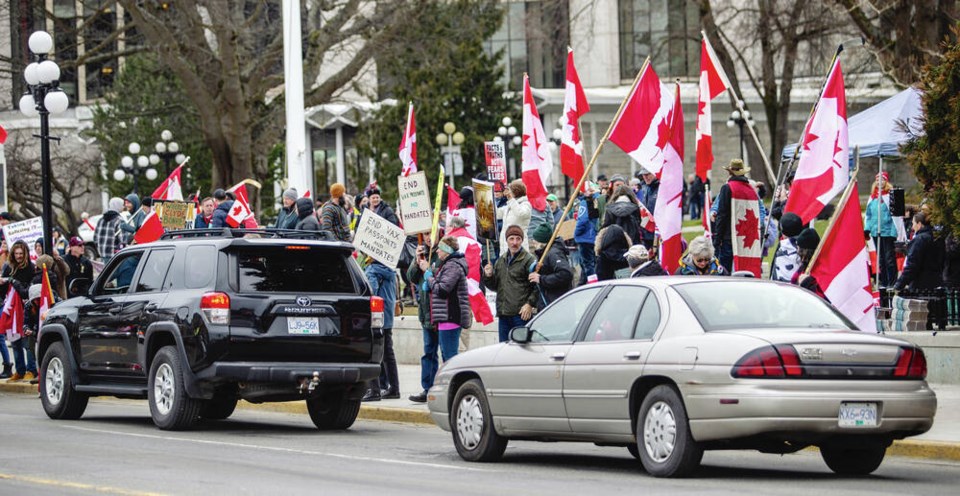The first two months of 2022 saw a series of protests and blockades against restrictions and mandates related to the COVID-19 pandemic in Ottawa and other parts of Canada. As is often the case in the social media era, there were plenty of allegations about which group—those making noise and those dreading it—had public opinion on its side.
Last month, a Research Co. survey looked at various aspects of the pandemic and found that more than half of Canadians (53 per cent) are convinced that strict public measures were warranted to stop the spread of COVID-19. On other aspects, the public is deeply divided.
For starters, practically seven in ten Canadians (69 per cent) say they followed news stories related to the protests and blockades “very closely” or “moderately closely.” This proportion is lower than the number of the country’s residents who are currently captivated by the tariffs dispute (84 per cent), but still noteworthy.
When Canadians look back on this period, the split is evident. We have 43 per cent of respondents who supported the actions of those who spoke against restrictions and mandates (up two points since April 2024), and 46 per cent (up four points) who opposed them. The actions of protesters were endorsed by just 31 per cent of Canadians aged 55 and over, compared with 47 per cent among those aged 35-54 and 50 per cent among those aged 18-34.
There is also a severe political divide. The visits of Conservative Party lawmakers to the occupants of vehicles parked in Ottawa’s streets did not go unnoticed. Fewer than two in five Canadians who voted for the NDP (37 per cent) or the Liberal Party (36 per cent) in 2021 supported the protests. Among Conservatives, the proportion rises markedly to 58 per cent.
The portrayal of the government’s actions as despotic managed to sway Conservatives just nine months prior to Pierre Poilievre taking over as leader of the party. Young Canadians, who were usually more skeptical of mandates, also took a second look at the party in power and became disenchanted. This combination is what led the Official Opposition in Ottawa to garner the support of 47 per cent of decided voters when the year began. The situation has changed after Justin Trudeau stepped down and Mark Carney took over as prime minister and Liberal leader.
Four statements on our survey are designed to gauge if Canadians identify with some of the goals espoused by the protesters. While we see half of respondents saying that the people protesting against restrictions and mandates were fighting for freedom (50 per cent, up five points), agreement is lower on whether the actions of protesters were justified (43 per cent, up one point). Two decidedly more radical ideas—the belief that no COVID-19 mandates and restrictions should have been implemented and that the federal government should be overthrown—are endorsed by just over a third of Canadians (34 per cent and 35 per cent, respectively).
As expected, the proportion of Conservative voters in 2021 who identify with the causes of the protesters is markedly higher. Almost two-thirds (64 per cent) regard them as “freedom fighters”, more than half (56 per cent) think their actions were justified, half (50 per cent) side with the call to overthrow the federal government, and just over two in five (41 per cent) think the mandates and restrictions related to the pandemic should have never been approved.
On a separate question, more than half of Canadians (56 per cent, down two points) tell us that the federal government’s decision to invoke the Emergencies Act to deal with these protests and blockades was justified, while fewer than a third (31 per cent, down one point) call it unjustified. The group that believes the situation warranted government intervention is larger than the one expressing sympathy for the protesters.
Canadians remain more preoccupied about the possibility of violence breaking out at the site of protests and blockades (77 per cent, up one point) or foreign money being used to fund the activities of protesters (70 per cent, up five points) than about the federal government relying on the Emergencies Act to end other protests in the future (64 per cent, down one point) or Canada’s image in the world being negatively affected by the protests and the federal government’s actions (61 per cent, up two points).
The 2025 federal election is not about the carbon tax or getting rid of Trudeau. Thanks to the persistent intervention of U.S. President Donald Trump, the ballot is also not about a fight for freedom or a review of how the COVID-19 pandemic was managed—even as 64 per cent of Canadians call for a federal inquiry.
There was a moment when the presence of Conservative politicians at the site of the blockades in Ottawa served to engage with the base. On the day the purported leaders of the “convoy” were found guilty of mischief, Poilievre was not standing outside the courthouse holding a box of donuts.
Mario Canseco is president of Research Co.
Results are based on an online survey conducted on March 23 and March 24, 2025, among 1,003 adults in Canada. The data has been statistically weighted according to census figures for age, gender and region in Canada. The margin of error—which measures sample variability—is +/- 3.1 percentage points, 19 times out of 20.


.jpg;w=120;h=80;mode=crop)

